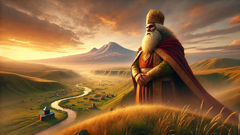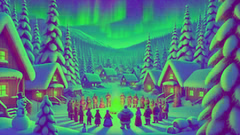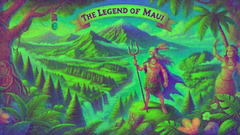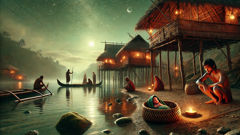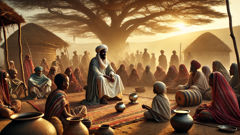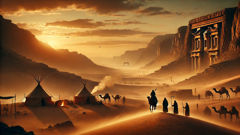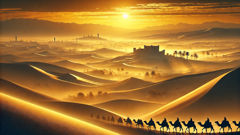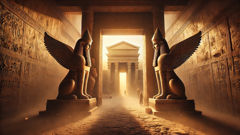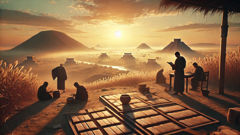Introduction
Among the rolling peaks and sunlit valleys of the Armenian Highlands, where mountain winds sweep across ancient stones and rivers carve their silver trails through emerald meadows, a legend was born—one that has shaped the soul of a people for millennia. In these lands, the memory of Hayk, the mighty patriarch and founder of the Armenian nation, is woven into every sunrise and echoed in the whispering pines. His story is not just a tale of battle and rebellion, but a living testament to the Armenian spirit: fiercely independent, unyielding, and forever bound to the rugged beauty of their homeland. Long before empires rose and fell, before cities crowned the hills or stone churches marked the horizon, there was Hayk—a man descended from the lineage of Noah, a giant among mortals, and a beacon for those yearning to live free from tyranny. Against the swelling shadow of Bel, the Babylonian king who sought to chain the world under his rule, Hayk’s defiance sparked a flame that would never be extinguished. The journey from exile in Babylon to the creation of Armenia was one of peril and hope, marked by the gathering of loyal kin, harrowing escapes, and a final confrontation that thundered beneath the sacred gaze of Mount Ararat. This is a story of courage—a legend whispered in every Armenian home, celebrated in their songs, and immortalized in stone carvings and epic verse. In the saga of Hayk and Bel, we find the birth of a nation and the heartbeat of a people determined to carve their destiny from the rock and sky. Here begins the legend of Armenia’s first hero: a tale of faith, valor, and a love of freedom that would withstand the storms of centuries.
Hayk’s Exile and the Call of Freedom
In the age when the world was young and kingdoms sprawled like shadows across the land, Babylon rose as the beating heart of power—a city of soaring ziggurats and bustling markets, ruled by the iron will of Bel, the king whose ambition was as boundless as the deserts around him. Bel saw himself as the master of all men, his word law and his throne eternal. He sent his emissaries far and wide, commanding fealty from distant clans and promising destruction to any who dared resist. But not all bowed to Bel’s might. Among those who refused was Hayk, a descendant of Japheth—grandson to Noah, whose ark once rested on the slopes of the sacred mountain. Hayk was a giant in both stature and spirit, known among his kin for wisdom, kindness, and strength that seemed to flow from the very earth beneath his feet.
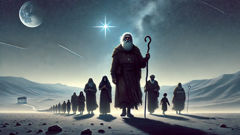
For years, Hayk endured life under Bel’s rule in Babylon. He watched as freedom dwindled, as kin and kith bent under the burden of servitude, their songs silenced and their dreams caged by fear. Yet in Hayk’s heart burned an ember of rebellion—a longing for green hills, open skies, and the right to live unshackled. One night, as the city slept beneath a canopy of desert stars, Hayk gathered his family and closest followers. Whispered words passed through the alleys and hidden courtyards. Their plan was perilous, but the yearning for liberty overcame all doubts. Under the cloak of darkness, with only the moon to guide them, Hayk led his people out of Babylon—turning their backs on oppression and setting their faces toward the promise of a new home.
The journey north was grueling. They crossed arid plains where the sun scorched the sand and bitter winds carried tales of those who had vanished before them. Some fell ill, others despaired, but Hayk’s presence gave them hope. He shared his strength, his laughter, and the vision that one day, they would settle in a land where their children could run free and their names would be spoken with pride. When they finally reached the fertile valleys nestled beneath Mount Ararat, a hush fell over the weary band. Before them lay a realm untouched by tyranny—a land where rivers glistened in the sun, forests hummed with life, and mountains watched like ancient guardians. Here, they built their first homes, tilling the soil, planting vineyards, and giving thanks to the gods for their deliverance. Hope blossomed alongside the spring wheat. Yet peace was fragile. News traveled to Bel that Hayk had defied him, leading his followers out of Babylon and refusing all summons to return. For a king who craved absolute rule, such defiance could not go unpunished. Bel’s rage was swift and terrible. He marshaled his armies—warriors clad in bronze and leather, chariots bristling with spears—and vowed to drag Hayk back in chains, or else scatter his bones to the vultures. The storm was gathering, but Hayk stood unafraid. In the shadow of Ararat, he sharpened his arrows and gathered his sons and grandsons around him. "We are free men," he told them. "Let no tyrant tear from us the gift our ancestors preserved. The land we have found is ours to defend, even if we must face the thunder of Babylon itself."
Thus began the march toward destiny, as Armenia’s first families prepared to stand for their freedom—no matter the cost.
The Clash Beneath Mount Ararat
Word of Hayk’s escape sent ripples through the kingdoms. Bel’s anger grew with each passing day, fed by pride and wounded authority. He summoned his generals, boasting that no rebel would escape his grasp. Across the plains, his army thundered—a mass of soldiers clad in burnished armor, banners fluttering, war drums echoing beneath the burning sun. They marched northward, intent on crushing Hayk’s fledgling clan.
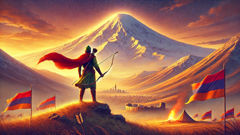
Hayk, meanwhile, did not cower. He called upon his sons—Aramaneak and others—his grandsons, and every able warrior who cherished freedom over fear. Together, they scouted the valleys, sending messengers to the scattered settlements, rallying all who shared their vision. In the shadow of Mount Ararat, the Armenian camp grew—a tapestry of tents and fires, where the old songs mingled with sharpening blades and whispered prayers to Aramazd, Anahit, and Vahagn the dragon-slayer.
Hayk’s presence was more than that of a leader; he was a living legend. He moved among his people, offering a word here, a steadying hand there. Children gazed at him with awe; elders blessed him; warriors pledged their lives to his cause. On the eve of battle, as the campfires flickered beneath a sky ablaze with stars, Hayk addressed his people. "We are not many, but our hearts are strong," he said. "Remember the soil beneath your feet and the children who sleep in your tents. If we fall, we do so with honor, and our names will not be forgotten."
Dawn broke red and fierce. The Babylonian host advanced across the valley, their armor gleaming like a river of fire. Bel rode at the center—tall, imperious, draped in robes of purple and gold, his chariot drawn by black horses. His eyes swept the land he believed would soon be his. Hayk stood at the forefront of his warriors, bow slung across his back, a great spear in hand. The two armies faced each other in tense silence, the only sound the wind sighing through the grass and the distant caw of ravens.
The clash began with a thunderous roar. Babylon’s chariots charged, arrows darkened the sky, and the ground shook with pounding feet. Yet Hayk and his kin fought like lions defending their den. They used every advantage—the bends of the rivers, the cover of trees, the rocky outcrops that shielded them from cavalry. Hayk himself was a force of nature. He strode across the battlefield, his voice rising above the chaos, rallying the faltering and striking down the enemy with the strength of ten men. His arrows flew swift and true, finding gaps in Babylonian armor.
But it was in a moment of stillness that legend was forged. As the tide of battle shifted, Hayk spied Bel—aloof atop his chariot, directing his warriors with cruel certainty. Hayk seized his mighty longbow and notched a great arrow. With a prayer to the gods and all his strength, he drew back and let fly. The arrow soared—a streak of sunlight—across the plain, piercing Bel’s breastplate and striking his heart. The Babylonian king toppled from his chariot, his banners collapsing around him. Panic spread through his ranks. Leaderless and terrified, the Babylonian soldiers fled. The Armenians cheered, their voices echoing from peak to peak. The tyrant was vanquished.
The site of Bel’s fall was named Haykashen—“the village of Hayk.” The victory did more than secure freedom; it bound the people to their land and to each other. From that day forward, they called themselves Hayastantsi—children of Hayk—and their homeland Hayastan, Armenia. The mountain wind carried the story across valleys and generations: how a patriarch’s courage won a nation’s birth.
Conclusion
The tale of Hayk and Bel has echoed across Armenia for thousands of years—not just as a story of a battle won, but as the defining heartbeat of a people’s spirit. Every year, as the sun sets behind Mount Ararat and families gather around their tables, this legend is retold: how courage and unity could overcome even the mightiest of tyrants. Hayk’s defiance taught the Armenians that freedom is not simply inherited, but earned through sacrifice and resolve. The land where Bel fell remains sacred, a testament to all who would choose liberty over subjugation. And so, the Armenian nation endures—rooted in mountains and memory, proud to bear the name of Hayk, whose arrow once changed the fate of a world.

